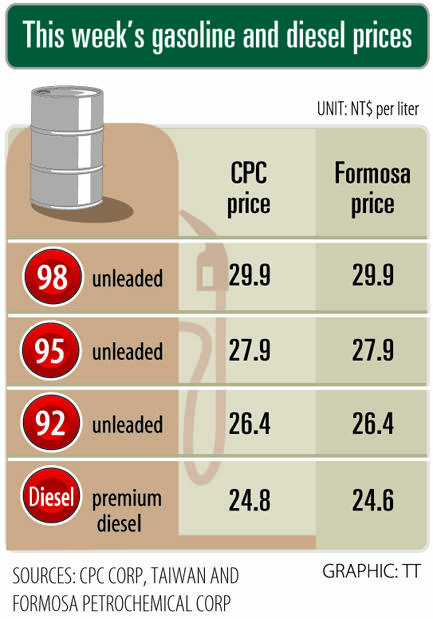Prices of gasoline and diesel products at domestic fuel stations are this week to fall NT$0.2 per liter, after international crude oil prices last week dropped for the second consecutive week, CPC Corp, Taiwan (台灣中油) and Formosa Petrochemical Corp (台塑石化) said yesterday.
International crude oil prices fell after US President Donald Trump said that US-Iran negotiations on a nuclear agreement had made progress, the companies said.
Concerns over plans proposed by some OPEC+ members to further increase production next month, along with stalled trade talks between China and the US, added more pressure on oil prices, they said.

Front-month Brent crude oil futures — the international oil benchmark — last week fell 1.36 percent to settle at US$63.9 per barrel on the Intercontinental Exchange, while West Texas Intermediate crude oil futures — the US oil gauge — dropped 1.2 percent to US$60.79 per barrel on the New York Mercantile Exchange.
Effective today, gasoline prices at CPC and Formosa stations are to fall to NT$26.4, NT$27.9 and NT$29.9 per liter for 92, 95 and 98-octane unleaded gasoline respectively, while premium diesel is to cost NT$24.8 per liter at CPC stations and NT$24.6 at Formosa pumps, the companies said.
Separately, liquefied natural gas prices for retail and industrial users would stay the same this month, although prices for power generation users, such as Taiwan Power Co (台電), would decrease 10 percent from last month, the CPC said.
Prices of liquefied petroleum gas (LPG) products such as household and automotive LPG, propane and butane, as well as propane and butane mixes, would also remain unchanged this month, it said.

With an approval rating of just two percent, Peruvian President Dina Boluarte might be the world’s most unpopular leader, according to pollsters. Protests greeted her rise to power 29 months ago, and have marked her entire term — joined by assorted scandals, investigations, controversies and a surge in gang violence. The 63-year-old is the target of a dozen probes, including for her alleged failure to declare gifts of luxury jewels and watches, a scandal inevitably dubbed “Rolexgate.” She is also under the microscope for a two-week undeclared absence for nose surgery — which she insists was medical, not cosmetic — and is

GROWING CONCERN: Some senior Trump administration officials opposed the UAE expansion over fears that another TSMC project could jeopardize its US investment Taiwan Semiconductor Manufacturing Co (TSMC, 台積電) is evaluating building an advanced production facility in the United Arab Emirates (UAE) and has discussed the possibility with officials in US President Donald Trump’s administration, people familiar with the matter said, in a potentially major bet on the Middle East that would only come to fruition with Washington’s approval. The company has had multiple meetings in the past few months with US Special Envoy to the Middle East Steve Witkoff and officials from MGX, an influential investment vehicle overseen by the UAE president’s brother, the people said. The conversations are a continuation of talks that

Nintendo Co hopes to match the runaway success of the Switch when its leveled-up new console hits shelves on Thursday, with strong early sales expected despite the gadget’s high price. Featuring a bigger screen and more processing power, the Switch 2 is an upgrade to its predecessor, which has sold 152 million units since launching in 2017 — making it the third-best-selling video game console of all time. However, despite buzz among fans and robust demand for pre-orders, headwinds for Nintendo include uncertainty over US trade tariffs and whether enough people are willing to shell out. The Switch 2 “is priced relatively high”

Alchip Technologies Ltd (世芯), an application-specific integrated circuit (ASIC) designer specializing in artificial-intelligence (AI) chips, yesterday said that small-volume production of 3-nanometer (nm) chips for a key customer is on track to start by the end of this year, dismissing speculation about delays in producing advanced chips. As Alchip is transitioning from 7-nanometer and 5-nanometer process technology to 3 nanometers, investors and shareholders have been closely monitoring whether the company is navigating through such transition smoothly. “We are proceeding well in [building] this generation [of chips]. It appears to me that no revision will be required. We have achieved success in designing